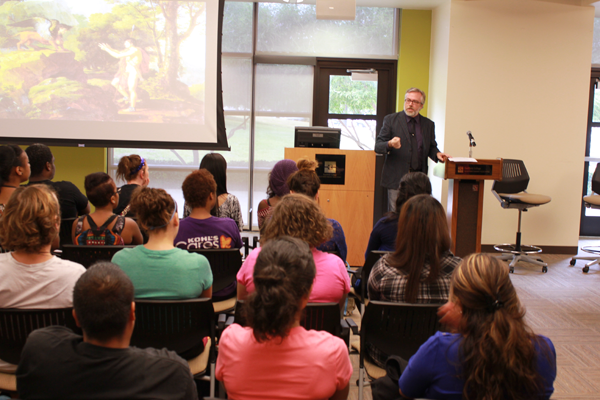
BY JUSTIN DAVID TATE, LIFE & ARTS EDITOR
Students filled G-101 on Sept. 17 to engage in a scholarly discussion about storytelling.
“Origins of Storytelling and Why It Matters” featured two speakers, English instructor Sean Sutherlin and visiting philosophy scholar Dr. Andy Amato, who each gave a brief history of storytelling and its importance. The event was part of the Common Book, “One Amazing Thing,” a novel that tells the stories of nine unique people.
“Life is a series of problems that we must confront and overcome, and as soon as we knock one down, another one pops up,” Sutherlin said. “So how do we deal with a problematic life? One of the ways we do that is through story.”
Sutherlin said story is a way of analyzing imagined scenarios where alternative solutions to a problem can play out without the real-world consequences.
To drive the point home, he brought up American psychologist John Garcia and his taste aversion experiments during the 1950s. In the experiment, Garcia gave a group of lab rats water that had been treated with radiation. The radiation made the rats nauseous, which made them avoid the water the next time it was offered.
Sutherlin believes these rats were using their thoughts to compose a tale of what could happen if they were to drink the water that made them sick.
“In their minds, their tiny little rat minds, they had created a narrative,” Sutherlin said. “They had created a little proto-story, an imagined scenario, a hypothetical situation: Something that wasn’t real, but something that they interacted with as if it were real in order to solve a real-world problem.”
Amato opened his portion of the talk by asking the students in the audience a question: Are you free?
The room remained dead quiet. Amato looked around and then asked again while encouraging students to respond.
Some said they were free because they didn’t have to be in college but chose to pursue a degree. Others said they weren’t free due to work and family obligations and expectations from others to do well in college.
This led to a discussion of “Oedipus Rex,” an ancient Greek tragedy about a man who tries in vain to avoid a disturbing prophecy.
“It was prophesied that he would murder his father and sleep with his mother, marry her and have babies,” Amato said. “That’s like a reality TV show.”

Oedipus would eventually, unknowingly, fulfill the prophesy he sought to avoid by running away.
Amato believes students are writing their own lives as they live them. Everyone is an author who, while not in control of every event in the story, can redirect his or her narrative down any chosen path.
Event organizers Amanda Preston and Amanda Pagel said they put together the discussion to challenge students. Pagel, an English professor, believes Amato achieved that by inviting the audience to apply the stories being discussed to their own lives.
“That’s connecting it to reality, not just in the realm of the philosophical and things that are [abstract],” Pagel said. “It’s bringing it to application in my life and how can I live in a manner that is telling my narrative, my mythology, my dream, my story?”
Although dance instructor Danielle Georgiou found the presentation enjoyable, she said one particular form of storytelling was left out.
“Before words were even in their existence, we had a visual language,” Georgiou said. “You had cave painting and you had dance.”
Georgiou, who is good friends with Sutherlin and Amato, hoped the two would cover how ancient generations of hunter-gatherers passed on information through dance.
“The men would dance out these stories to show their kids, ‘Soon you will become a man, and you will be doing this, and this is what it looks like,’” she said.
Georgiou said sometimes movement is a better way to express emotion in a story than the written word. Those who find thick books intimidating may be able to discover an alternative way of ingesting the story that could help them understand it better.
“I really think that putting it into a non-oral way, a non-written form, is one of the best ways to understand something,” Georgiou said. “Paint it, draw it, sculpt it, dance it, act it, because you actually get to embody it.”







